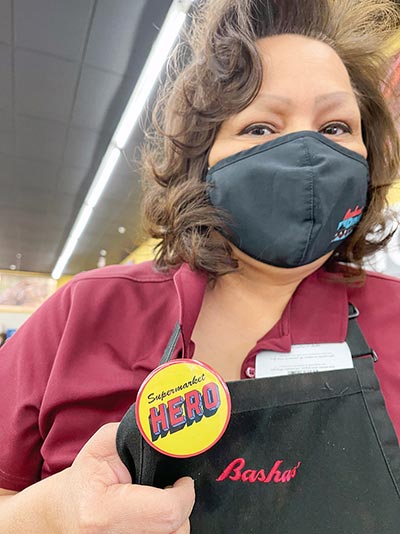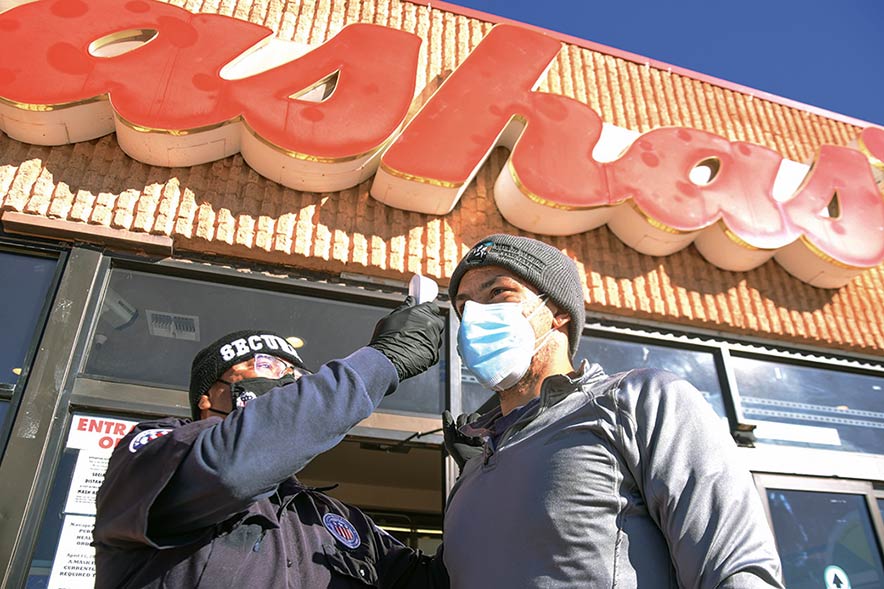
‘You’re going to face death’: After a year of pandemic, grocery workers celebrate survival
By Krista Allen
Special to the Times
TÓNANEESDIZÍ, Ariz.
They always thought of themselves as grocery store workers. When the coronavirus pandemic began, they instantly became frontline workers fighting to keep their homes and communities safe.
“We never thought we would be thrown into this specific role as a frontline worker,” said Reva Hoover, the assistant customer service manager at Bashas’ Diné Market, which is located more than 70 miles away from the next grocery store in Flagstaff, Kayenta or Page.
“That’s like saying, ‘You’re going to face death’ and that’s kind of surreal,” she said. “It’s unrealistic that we actually had to think like that. ‘You’re going to face death today.’
“You don’t know what’s going to happen next,” she said.
Tuba City Regional Health Care workers like Dr. Sophina Manheimer Calderon, Dr. Diana Hu, Dr. Bill Orman and Dr. Jennifer Whitehair have been celebrated as heroes for treating coronavirus patients.
Now Bashas’ is celebrating – one year after COVID-19 first entered the Navajo Nation – its frontline workers who got up every morning to put food on the shelves and expose themselves to the virus, all while dealing with decreased hours and some customers who refused to wear masks.
“It was scary for a while,” Hoover said. “It was very scary. A lot of us had to get in there and just keep doing our job that we had to do.
“Many of us have lost loved ones,” she said. “For a while there, it was just one after another.”
One year later

Special to the Times | Krista Allen
Reva Hoover, the assistant customer service manager for Bashas’ Diné Market in Tónaneesdizí, shows her “Supermarket Hero” button during the store’s recent celebration for its frontline workers.
In the one year since, more than 1,170 families in Diné Bikéyah have suffered the shock and devastation of losing a loved one to COVID-19.
When COVID-19 cases began to surge a year ago, the Navajo Nation imposed closures, curfews and lockdowns. People retreated. The change was swift and striking.
The long months of strict closures, curfews and harsh lockdowns are fading from view. But as people here move on, they will never forget the Diné who lost their lives to the deadly coronavirus. And the loss is beyond anything numbers can convey.
“Hopefully we’ll get down to zero pretty soon,” Hoover said of the Nation’s goal to get to zero cases and normalcy. “That should be everybody’s goal when you go to work, when you go home (at the end of the day).”
It has been a long, difficult year in the Nation. Because there are still many tough weeks ahead, Hoover said she and her colleagues are still taking precautions such as taking a shower and changing clothes when they return home from work.
“That should be everybody’s goal when you come home from work,” Hoover said. “You still have to change your clothes right away, you still have to make sure you don’t carry anything home with you on your shoes, on your body, in your hair – anything like that because this virus will attack.”
Taking precautions
Grocery store employees are likely to be at heightened risk of COVID-19 infection, with those in customer-facing roles five times as likely to test positive as their colleagues in other positions, according to a recent study published in the Journal of Occupational and Environmental Medicine.
And this can put both customers and employees at risk – especially if people don’t adhere to social distancing and wear a mask.
To protect employees and customers from contracting and potentially spreading COVID-19, Bashas’ immediately took precautions early on to keep everyone safe.
“We just had to keep at it,” said Sarra Semallie, store director for Bashas’ here in Tónaneesdizí. “Wipe things down, do this, do that, just an everyday thing.
“And everybody (employees) got used to it and now we’re doing it every 30 minutes,” she said. “And every 30 minutes you’ll see members (employees) wiping things down. Everything in here they wipe down – the meat department, bakery, all around the store.”
Semallie has a team of 68 employees from across Western Navajo.
“So everything for our members, for their safety, we try to emphasize that,” Hoover said. “One thing that we have done and implemented is a safety feature for our break room. Everybody would go in and hang out.

Special to the Times | Krista Allen
Security guard Jeremy John performs a temperature check on John Tolliver, whom he calls brother. One of Jeremy’s jobs during the COVID-19 pandemic is to check patrons for fever before they enter the store.
“Now we have a limit of four people,” she said. “Everything that we do, we try to do it for the safety of our members and making sure that they’re able to go home and do things like normal.”
Hoover said the work ethic in the store was instilled by Semallie who often inspired and brought her team together during the pandemic.
“She said, ‘Someone’s got to do this and we have to do this. We can’t step back and expect somebody else to do it for us because we have elders, we have grandparents who shop here on a regular basis. We have family members who need these things,’” Hoover said.
“I’m grateful we have a backing from our store director, from our store managers,” she said. “When someone walks into our store, we want to make sure they understand that they are comfortable shopping here.”
Hard-to-find items
In some areas, Clorox or Lysol disinfectant wipes and Germ X and Purell hand sanitizers remain stubbornly elusive, even at Bashas’ where cleanliness is on the minds of many customers.
“When the pandemic first started, I think we were kind of seen as we’re able to get our first dibs on everything that comes in like the toilet paper, the Lysol, the Clorox – all of that,” Hoover said. “But it really wasn’t like that.
“We had to take a step back and we had to offer it to our community first,” she said. “We didn’t get the extra, we actually had to stand back and wait for our customers to serve.”
Bashas’ here serves three tribes – Diné, Kiis’áanii, and the San Juan Southern Paiute – and many other people traveling on U.S. Route 160.
And many of the customers include TCRHCC frontline workers like Dr. Hu who will not only go into the store to shop but also take the time to ask the store employees about their well-being.
“We have to always keep our guard up,” Hoover said. “We can’t let our guard down with anything. But today we can breathe. We’re here still. We’re blessed to be able to come to work. We’re still blessed to be able to go home to our families.
“That’s the mindset we have to take every day – that we’re blessed,” she said. “We’re in good hands. We’ve always been in good hands. And with daily prayer and just believing that God will protect us.”
Gatekeeper for COVID
Jeremy John, the security guard for Bashas’, became a gatekeeper armed not only with a sidearm but also a thermometer gun to screen out feverish individuals who may carry COVID-19 at the entrance of the store.
John, from Tónaneesdizí, said some patrons like the fever checks because it makes them feel safer while shopping inside. Some scoff at it, as well as the mask mandate and social distancing requirements.
“Me and my brother, John Tolliver, have been here since the beginning of the pandemic,” John said. “A lot of people don’t wear a mask. It’s mainly the minorities, the travelers that go through here. They don’t like to wear a mask and when you kindly ask them to wear a mask, they get (upset).”
Tolliver, who’s originally from the Pacific Northwest, said he got a job at Bashas’ in April 2020.
“That’s what we try and implement for our members – safety,” Hoover said, “so that they can actually go home, and they don’t have to worry as much.
We have Plexiglas (installed) in each department for everyone’s safety,” she said. “We’re taking precaution in a different way now. A lot of people are getting vaccinated, and a lot of people are changing their life habits. You’ll see kids running over … to the hand sanitizer and they’ll make sure their hands are clean.”
Hoover contracted COVID-19 last March, when facemasks weren’t yet mandated in the store. She had a 100-degree-plus fever and a sore throat. She was told to go home until symptoms did not reappear for 72 hours.
Hoover was home for 16 days and was quarantined inside a room for 14 days, during which she wore a facemask to keep her family safe.
She, along with her colleagues, was vaccinated right alongside the TCRHCC workers and first responders when the Pfizer-BioNTech COVID-19 vaccine first became available in Western Navajo.
Hoover said there was never a time she wanted to quit her job because of the pandemic. She has been working here for 23 years.
“My mindset is here,” she said. “I’ve always known this is where I belong. You can’t go into that mindset to where you’re like, ‘Ugh, I give up!’
“Because that’s not who we are as Diné,” she said. “We’re taught to keep pushing forward, keep enduring and there’s no time to quit. You can’t think like that.”
Semallie said working through a pandemic is truly terrifying when one has to work in close quarters with other people.
“And everything we’re doing, we’re doing a good job – a very good job,” Semallie added. “I just want to thank all my (team) members, my heroes.
“I really appreciate what they’re doing every single day,” she said.
“I want to thank them from the bottom of my heart, and I want to thank all the customers who are coming in to shop with us here every day throughout the week,” she said.
Hoover added, “We’re awesome! Our members are our family. We’re keeping ourselves happy and motivated every day.”
As a public service, the Navajo Times is making all coverage of the coronavirus pandemic fully available on its website. Please support the Times by subscribing.
How to protect yourself and others.
Why masks work. Which masks are best.
Resources for coronavirus assistance








 Highway 264,
Highway 264, I-40, WB @ Winslow
I-40, WB @ Winslow